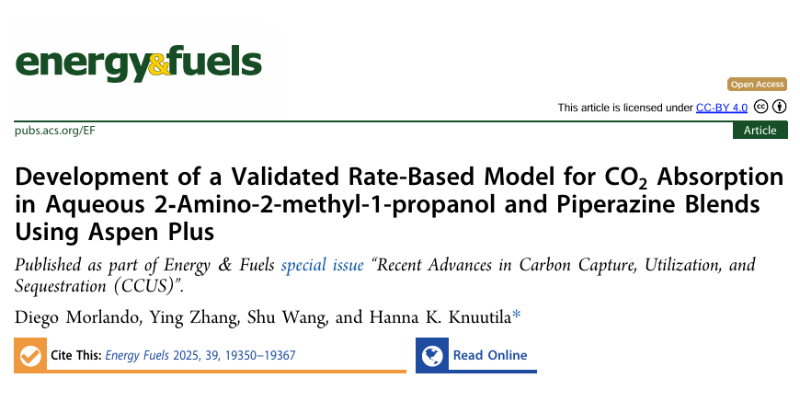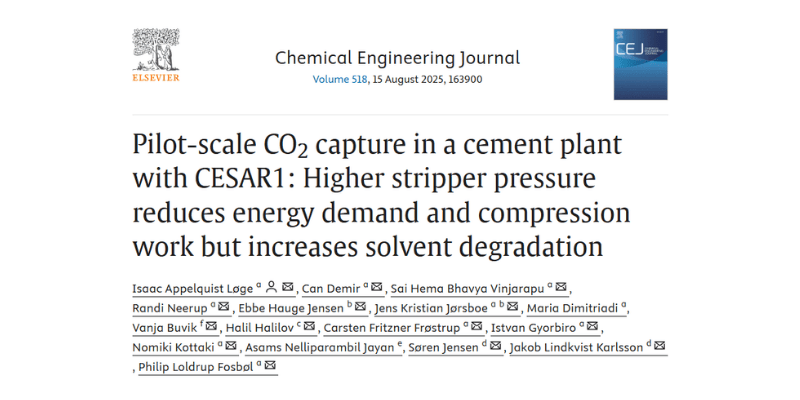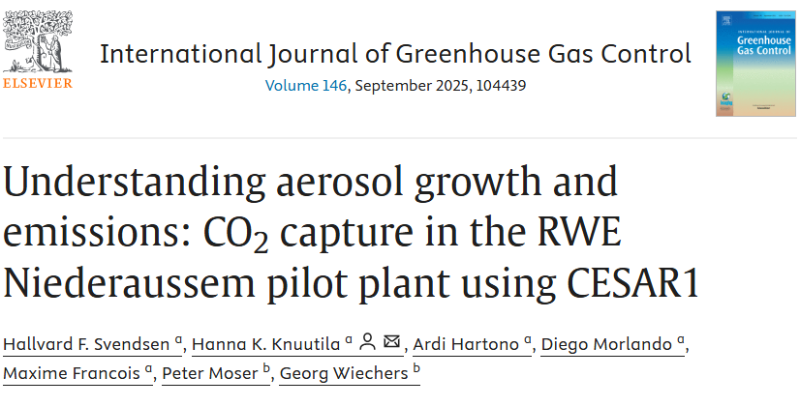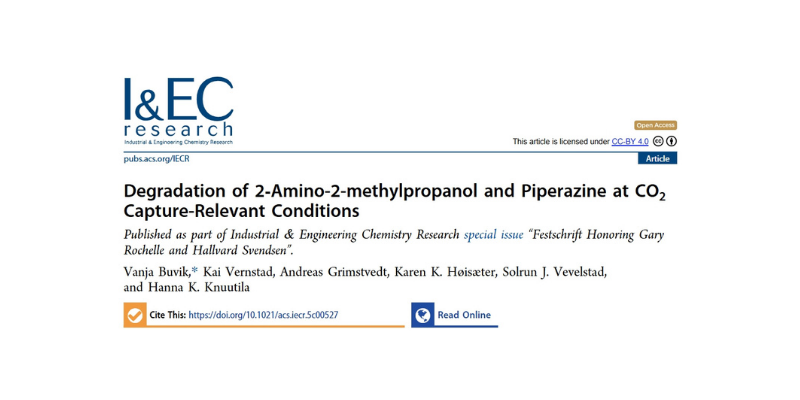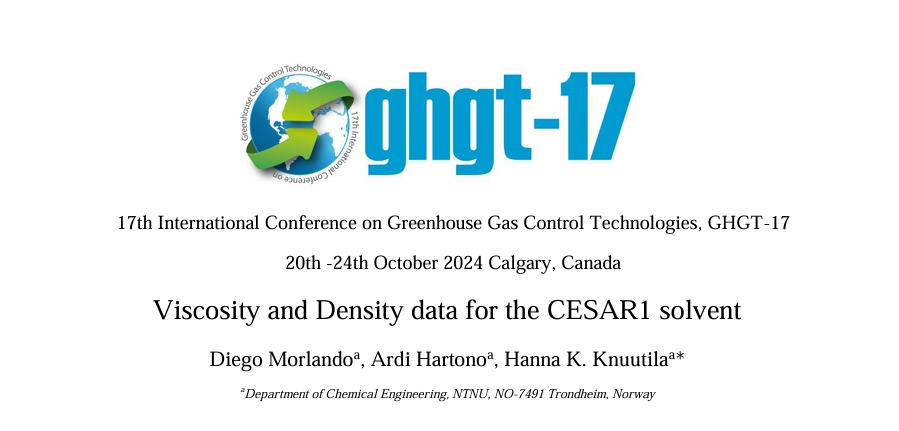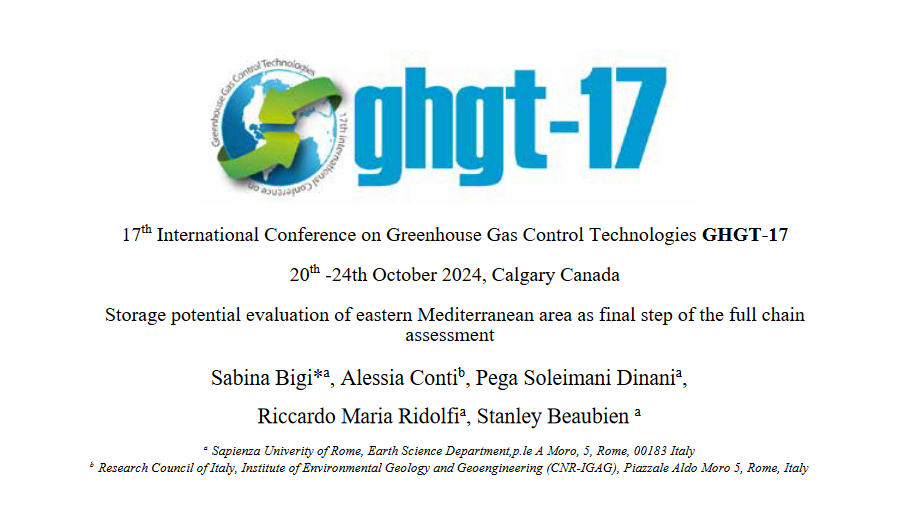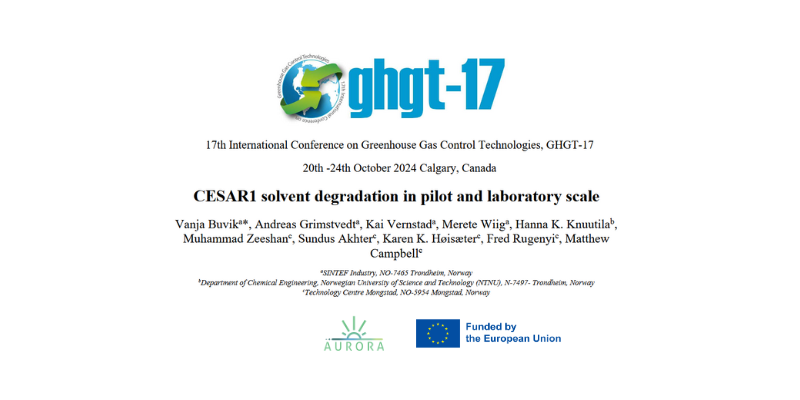AURORA, short for “Accelerated Deployment of Integrated CCUS Chains Based on Solvent Capture Technology”, is a major research and innovation project funded under the Horizon Europe program. Launched in January 2023, the project runs for three and a half years and brings together partners from six European countries: Norway, the United Kingdom, Belgium, France, Italy, and Greece.
The Need for Solvent-Based Carbon Capture
Industries that emit large amounts of CO₂, such as refining, cement, and materials recycling, require rapidly scalable and cost-effective carbon capture technologies to achieve climate goals. Solvent-based carbon capture is one of the most promising solutions because it is:
- Adaptable to various emission sources.
- Capable of achieving high capture rates and delivering CO₂ with high purity.
- Relatively energy efficient compared to other technologies.
AURORA’s Innovations and Goals
The AURORA project aims to optimize and demonstrate the use of the open, non-proprietary CESAR1 solvent technology for commercial deployment. CESAR1, which is a blend of AMP and PZ, will serve as the new benchmark solvent, replacing older options like MEA. The project focuses on three CO₂-intensive industries: refining, cement production, and materials recycling—industries for which few decarbonization alternatives exist.
Demonstration Across Multiple Sites
The AURORA project will integrate these innovations into four optimized capture processes, which will be demonstrated at three pilot plants of varying sizes and complexity:
- SINTEF’s Tiller pilot (Norway): A medium-scale facility for testing and validation.
- ACC’s mobile test unit: A flexible and portable system.
- Technology Centre Mongstad (TCM): A large-scale demonstration plant, offering real-world operational insights.
The diversity of these pilot plants allows AURORA to validate its technology under different conditions, enhancing its credibility for future deployment.
To ensure that the results benefit other CO₂-intensive industries, AURORA will conduct full assessments of the carbon capture, utilization, and storage (CCUS) chain for its industrial end-users. The project focuses on two European regions—Belgium and Greece—which offer unique conditions for implementing CCUS value chains. This regional focus will demonstrate the transferability of AURORA’s solutions to other industries and locations, further accelerating the adoption of solvent-based carbon capture across Europe.
By optimizing CESAR1 technology and demonstrating its capabilities in real industrial settings, the AURORA project aims to revolutionize CO₂ capture in energy-intensive sectors. Through innovative process design, energy efficiency improvements, and strong collaboration among partners, AURORA is paving the way for the accelerated deployment of CCUS technologies, helping industries move closer to climate neutrality.
Publication – Development of a Validated Rate-Based Model
Abstract In this work, we developed a new e-NRTL thermodynamic framework for CO2 absorption in aqueous mixtures of 2-amino-2-methyl-1-propanol (AMP) and piperazine (PZ) in Aspen Plus. The e-NRTL AMP/PZ/H2O/CO2 model was fitted on experimental data covering a range of AMP concentration from 12 to 48 mass % and PZ concentration…
Publication – Pilot-scale CO2 capture in a cement plant with CESAR1
Abstract Carbon capture from hard-to-abate industries is essential. This study investigates the effect of stripper pressure on the performance of amine-based CO2 capture from cement flue gas, using the CESAR1 solvent. Through a rigorous data filtering and binning methodology, experimental results were systematically categorized, enabling a precise evaluation of how…
New Publication: Aerosol Modeling in CO2 absorption using CESAR1
We are proud to announce that Hallvard F. Svendsen, Hanna K. Knuutila, Ardi Hartono, Maxime Francois and Diego Morlando at NTNU, together with external collaborators Peter Moser (RWE) and Georg Wiechers (RWE) have published a new article presenting results from the AURORA and SCOPE projects.The publication introduces a new class-based…
Thermodynamic Properties of CO₂ Absorption in CESAR1 — Essential Data for Better Process Modelling
We are proud to announce a new scientific publication from the AURORA project, authored by Diego Morlando, Ardi Hartono and Hanna K. Knuutila, published in Carbon Capture Science & Technology. This important work provides extensive experimental data on the thermodynamic properties of CESAR1, a key solvent blend for industrial carbon…
Journal Publication – In-Depth Study of CESAR1 Solvent Degradation Under CO₂ Capture Conditions
A new scientific publication based on research from the AURORA project has just been released in the journal Industrial & Engineering Chemistry Research. This study delivers an in-depth analysis of the degradation behaviour of the CESAR1 solvent —a popular choice for solvent-based post-combustion CO₂ capture.This work, developed under the AURORA…
Conference publication – GHGT-17: Viscosity and Density data for the CESAR1 solvent
Abstract Global warming is a major issue that needs to be addressed and limited. The CESAR1 solvent blend has a high potential for becoming a commonly employed, commercial solvent system. In this work, the viscosity and density data for aqueous CO2 loaded CESAR1 (26.6 wt.% AMP 12.8 wt.% PZ) solution…
Conference publication – GHGT-17: “Storage potential evaluation of eastern Mediterranean area as final step of the full chainassessment”
The final step in capturing and storing carbon dioxide (CO₂) emissions is geological storage, where CO₂ is injected deep underground into carefully chosen locations. These locations could be natural formations like saline aquifers (underground reservoirs filled with salty water) or empty oil and gas fields.This work, part of the AURORA…
Understanding Solvent Degradation in CO₂ Capture – CESAR1 Solvent Degradation in Pilot and Laboratory Scale
The fight against climate change requires innovative solutions, and one promising method is CO₂ capture and storage (CCS). CCS involves capturing carbon dioxide from industrial emissions before it reaches the atmosphere. At the heart of this process are specialized chemical solvents, such as CESAR1, which absorb CO₂ from flue gases.While…
Turning Waste Into Opportunity: Thermal Reclamation Chemistry of Common Amine Solvents
CO2 capture technology is vital for reducing greenhouse gas emissions. But what happens when the chemicals used in this process wear out or degrade? Scientists have been studying how to rejuvenate these chemicals through a method called thermal reclaiming. This research focuses on ethanolamine (MEA), a widely used solvent for…
Closing Knowledge Gaps – Density and Viscosity of Unloaded and CO2-loaded Aqueous AMP-PZ blends
AURORA’s latest scientific journal publication provides experimental density and viscosity data on different unloaded and CO2-loaded aqueous blends of 2-amino-2-methyl-1-propanol (AMP) and piperazine (PZ) used for absorption-based CO2 capture. The paper also provides correlations for density and viscosity suitable for various modelling works.In our previous review article, we identified knowledge…
Publication – Development of a Validated Rate-Based Model
Abstract In this work, we developed a new e-NRTL thermodynamic framework for CO2 absorption in aqueous mixtures of 2-amino-2-methyl-1-propanol (AMP)…
Publication – Pilot-scale CO2 capture in a cement plant with CESAR1
Abstract Carbon capture from hard-to-abate industries is essential. This study investigates the effect of stripper pressure on the performance of…
New Publication: Aerosol Modeling in CO2 absorption using CESAR1
We are proud to announce that Hallvard F. Svendsen, Hanna K. Knuutila, Ardi Hartono, Maxime Francois and Diego Morlando at…
Thermodynamic Properties of CO₂ Absorption in CESAR1 — Essential Data for Better Process Modelling
We are proud to announce a new scientific publication from the AURORA project, authored by Diego Morlando, Ardi Hartono and…
Journal Publication – In-Depth Study of CESAR1 Solvent Degradation Under CO₂ Capture Conditions
A new scientific publication based on research from the AURORA project has just been released in the journal Industrial &…
Conference publication – GHGT-17: Viscosity and Density data for the CESAR1 solvent
Abstract Global warming is a major issue that needs to be addressed and limited. The CESAR1 solvent blend has a…
Conference publication – GHGT-17: “Storage potential evaluation of eastern Mediterranean area as final step of the full chainassessment”
The final step in capturing and storing carbon dioxide (CO₂) emissions is geological storage, where CO₂ is injected deep underground…
Understanding Solvent Degradation in CO₂ Capture – CESAR1 Solvent Degradation in Pilot and Laboratory Scale
The fight against climate change requires innovative solutions, and one promising method is CO₂ capture and storage (CCS). CCS involves…
Turning Waste Into Opportunity: Thermal Reclamation Chemistry of Common Amine Solvents
CO2 capture technology is vital for reducing greenhouse gas emissions. But what happens when the chemicals used in this process…
Closing Knowledge Gaps – Density and Viscosity of Unloaded and CO2-loaded Aqueous AMP-PZ blends
AURORA’s latest scientific journal publication provides experimental density and viscosity data on different unloaded and CO2-loaded aqueous blends of 2-amino-2-methyl-1-propanol…


